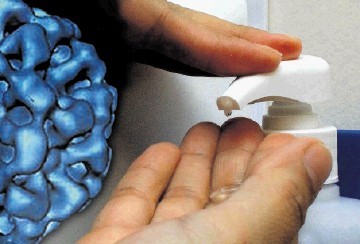
Cases of Norovirus (winter vomiting bug) have started to appear earlier than usual this year, which could indicate that we can expect higher than customary levels of the virus to be circulating over the winter months ahead.
Norovirus infection is the most common cause of infectious gastroenteritis (vomiting and diarrhoea) and it is estimated that in the UK between 600,000 to 1million people catch the bug every year.
Anyone who has had Norovirus knows that it’s an unpleasant bug that causes vomiting and diarrhoea. Fortunately, the symptoms usually clear up after a couple of days but the bug is extremely contagious and can spread like wildfire from person to person.
Infected people should rest and drink fluids to prevent dehydration. Young children and the elderly may be more adversely affected as they are at added risk from dehydration.
Most generally manage their symptoms with painkillers (like paracetamol) and anti-nausea medications. Anti-diarrhoeals may prolong the illness and are not recommended. If symptoms last more than three days, seek medical attention.
The Norovirus bug is present in the faeces and vomit of infected people and is spread directly and indirectly.
When a person vomits, infective particles are sprayed out into the air and you might be surprised to learn that these particles can travel up to a two-metres radius,
The virus can also be spread from person to person after someone uses the bathroom and doesn’t wash their hands properly afterwards.
It gets on to shared objects such as door handles and if a healthy person touches a contaminated object, the virus can get on to their hands. When the person touches their eyes, nose or mouth with dirty hands, they become infected.
Infected people can pass it along to others as soon as they show symptoms and can continue to spread it to others for as long as 48 hours after their symptoms have disappeared. The virus can live on surfaces for days, leaving them contaminated long after the sick person has left the area.
Norovirus can also spread through contaminated food or water. It is important that infected people avoid preparing food for others until they have been symptom-free for 48 hours.
In previous articles we have talked about the importance of hand hygiene and when it comes to preventing the spread of Norovirus, scrupulous hygiene is vital! We should all be washing our hands frequently and here are some pointers below for washing hands properly.
o Wet your hands with clean, running water and apply soap (liquid or bar).
o Work into a good lather by rubbing your hands together and scrub them well including the backs of your hands, between your fingers and under your nails.
o Continue rubbing your hands for at least 20 seconds (you can time yourself by singing “Happy Birthday To You” twice).
o Rinse your hands well under running water.
o Dry your hands using a clean towel or an air dryer.
It is especially important to wash before eating, after using the bathroom, and before touching your face.
You can use alcohol-based hand sanitisers in addition to washing with soap and warm water but NOT instead of.
Everyone needs to take basic precautions to reduce the chance that they become infected and to reduce the chance of passing the illness on to others.
People working offshore on a rig or installation live and work in close proximity to their colleagues and share bathroom and toilet facilities.
You can imagine the numerous opportunities for bacteria to be spread by touch such as on keyboards, telephones, door handles, tools and handrails. Frequent and thorough hand washing really is the best defence.
The illness comes on quickly and infected people feel very unwell quite suddenly. So if you or any of your colleagues are experiencing the first signs of the bug such as a sudden feeling of nausea followed by vomiting and diarrhoea, you must go to the medic as quickly as possible.
Cheryl Carroll is occupational health and medical governance manager at Abermed.